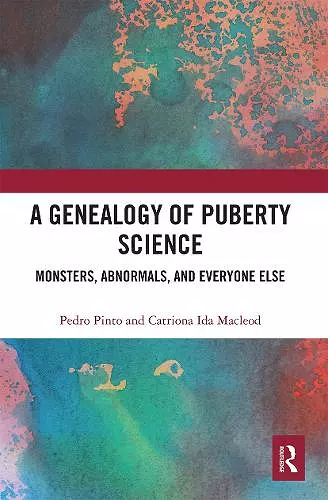A Genealogy of Puberty Science
Monsters, Abnormals, and Everyone Else
Pedro Pinto author Catriona Macleod author
Format:Paperback
Publisher:Taylor & Francis Ltd
Published:30th Sep '20
Currently unavailable, and unfortunately no date known when it will be back
This paperback is available in another edition too:
- Hardback£155.00(9781138295391)

A Genealogy of Puberty Science exploresthe modern invention of puberty as a scientific object. Drawing on Foucault’s genealogical analytic, Pinto and Macleod trace the birth of puberty science in the early 1800s and follow its expansion and shifting discursive frameworks over the course of two centuries.
Offering a critical inquiry into the epistemological and political roots of our present pubertal complex, this book breaks the almost complete silence concerning puberty in critical theories and research about childhood and adolescence. Most strikingly, the book highlights the failure of ongoing medical debates on early puberty to address young people’s sexual and reproductive embodiment and citizenships.
A Genealogy of Puberty Science will be of great interest to academics, researchers and postgraduate students in the fields of child and adolescent health research, critical psychology, developmental psychology, health psychology, feminist and gender studies, medical history, science and technology studies, and sexualities and reproduction studies.
"Pinto and Macleod not only show the gaps in the scientific construction of ‘early puberty’ but also these instigate and rely upon ideological tropes of gender and racialized differences, both intersected by class. Not only is this a really important work of scholarship in its genealogical analysis of original historical documents, but the emerging critique convincingly highlights, through the attention to the so-called crisis in puberty, how science masks its own ambiguities at the expense of normalizing and pathologizing the pubertal child and her/his parents. The most supposedly natural and biological of developmental processes, puberty, is so rendered only by most unnatural knowledge generation practices. Pinto and Macleod take the specific example of puberty and brilliantly show how it exemplifies and illuminates wider axes and processes governing the management of young bodies and minds."
Erica Burman, Professor of Education, The University of Manchester; author of Deconstructing Developmental Psychology and other books)
"This book is a real tour de force – an eloquent, thought-provoking and detailed genealogical analysis of puberty science. It traces the way that medical science gradually got to grips with the phenomenon of puberty, and, especially the threats it was seen to pose to social and moral order. Its focus on ‘precocious puberty’ traces a historical story of the successive ways in which puberty has been problematized. It is elegantly drawn, and highly informative."
Wendy Stainton Rogers, Emeritus Professor, The Open University; co-author of Stories of Childhood: Shifting Agendas of Child Concern and other books).
"Meticulously researched and written with much gusto, this book provides a gripping account of the history of pubertal science. Filling a major gap in Foucault's account of the history of modern sex, it demonstrates genealogy's enduring importance in addressing the significant questions of our age."
Professor Celia Roberts, ANU College of Arts and Social Sciences.
"Pinto and Macleod not only show the gaps in the scientific construction of ‘early puberty’ but also these instigate and rely upon ideological tropes of gender and racialized differences, both intersected by class. Not only is this a really important work of scholarship in its genealogical analysis of original historical documents, but the emerging critique convincingly highlights, through the attention to the so-called crisis in puberty, how science masks its own ambiguities at the expense of normalizing and pathologizing the pubertal child and her/his parents. The most supposedly natural and biological of developmental processes, puberty, is so rendered only by most unnatural knowledge generation practices. Pinto and Macleod take the specific example of puberty and brilliantly show how it exemplifies and illuminates wider axes and processes governing the management of young bodies and minds."
Erica Burman,Professor in the Manchester Institute of Education, The University of Manchester; author of Deconstructing Developmental Psychology.
"This book is a real tour de force – an eloquent, thought-provoking and detailed genealogical analysis of puberty science. It traces the way that medical science gradually got to grips with the phenomenon of puberty, and, especially the threats it was seen to pose to social and moral order. Its focus on ‘precocious puberty’ traces a historical story of the successive ways in which puberty has been problematized. It is elegantly drawn, and highly informative."
Wendy Stainton Rogers, Emeritus Professor, The Open University; author of Stories of Childhood: Shifting Agendas of Child Concern.
"Meticulously researched and written with much gusto, this book provides a gripping account of the history of pubertal science. Filling a major gap in Foucault’s account of the history of modern sex, it demonstrates genealogy’s enduring importance in addressing the significant questions of our age."
Celia Roberts, Professor in the ANU College of Arts and Social Sciences; author of Puberty in Crisis: The Sociology of Early Sexual Development.
ISBN: 9780367661434
Dimensions: unknown
Weight: 450g
234 pages